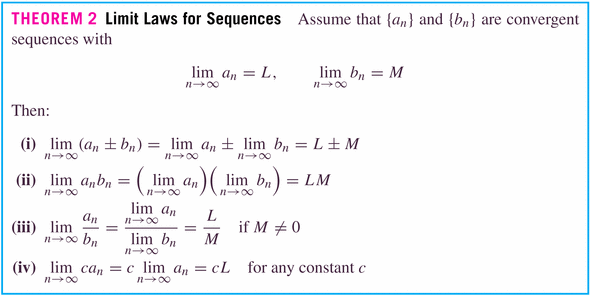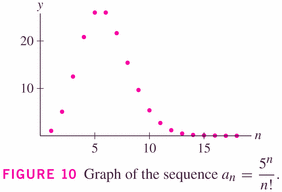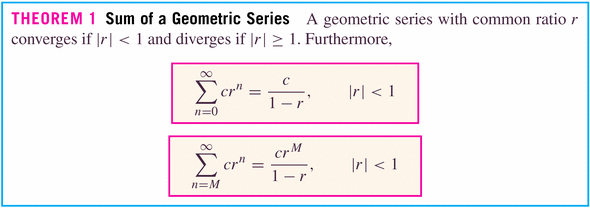- You have a homework due today.
- Your quiz opportunity today is over 11.2: series
-
Here's a first example of a sequence:
- Definition: A sequence is a function f(n) whose
domain is a subset of the integers. The values
are called the terms of the sequence and n is called the index. For most of our sequences, the domain will be the natural numbers: {1, 2, 3, ....}.
- In the example sequence above, what do you suppose is the limit of
the sequence as
?

- There are lots of other sequences that we might encounter
naturally: for example, there's one in probability and statistics that
is closely related to the one we just looked at: the Poisson
distribution, which has as its probabilities the sequence
(What must be true about the sum of the terms? Can we add up an infinite number of terms? This is the subject of the next section -- series.)
- Other sequences might be defined in terms of a function. For
example,
Examples:
- #3, p. 724
- #6
Other sequences are defined by "recurrence" (e.g. the Factorials; the Fibonacci numbers)
Example:
- #12, p. 724

Here's an especially interesting historical limit:

- One piece of good news: the obvious rules for limits are working:

Examples:
- #26, p. 724
- #27
- #29
- Some vocabulary: bounded sequences....

And some theorems related to this notion:

(especially useful for alternating sequences)

(note that the converse is false)

Let's use Theorem 6 to show that the sequence we initially considered is convergent:

- Geometric sequence: a sequence of the form
where r is called the common ratio.
- Examples:
- #23, p. 724
- #83, p. 726
- #92

What would we get if we could add up all these (infinite!) terms? (147.4131591025766....)
- A handout concerning series.
- Once we have some series in hand, we might want to start operating with them. In particular, as we saw in our very first series, we might want to add up the terms:

In particular, we expect that, if we throw in the
term, we should get
Such as sum is called an infinite series.
- The question which presents itself is this: what do we mean by this sum of an infinite number of terms? This is indeed curious.
- Here's how we make sense of that infinite sum:
- From the sequence
we define a new sequence
:
These are called partial sums. If
Then we say that
exists, and is equal to
. This justifies our probability distributions of the form
:
Because, in general,
This is an astonishing fact: we can think of an exponential function as a polynomial with an infinite number of terms. In fact, we can think of lots of functions this way (e.g. sines and cosines!). This is where we're headed in this class....
More formally,

Now geometric series are sufficiently important that it's useful to include that special case:

There's a really fun proof of the first part above, based on a trick. Let's have a look at it.

This theorem tells us that if a sequence isn't asymptotic to the x-axis, we can forget about its partial sums converging.
Finally, series behave the way we'd hope:

- Examples:
- From the sequence